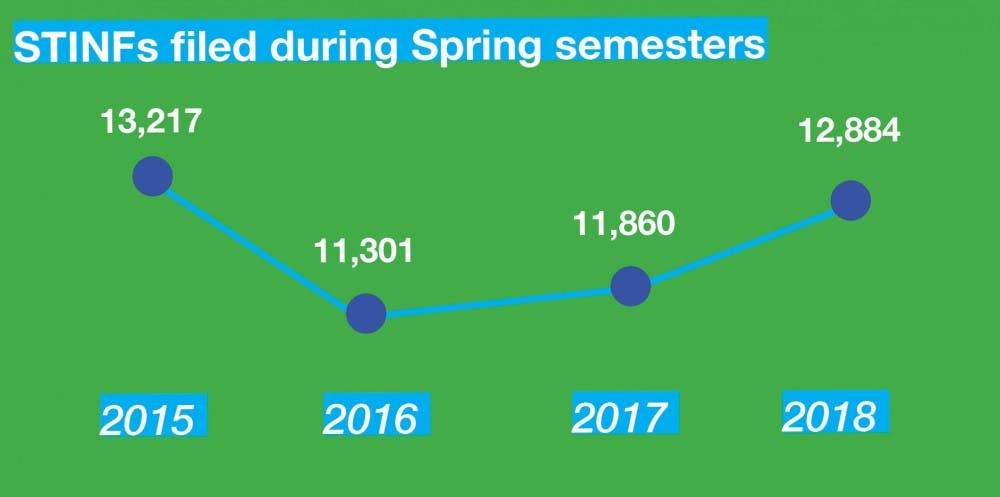Despite hosting extra flu shot clinics and temporarily shutting Krzyzewskiville, the University received about 1,000 more Short-Term Illness Notification Forms this past spring semester than for the same period in 2017.
Academic Dean Jenny Wood Crowley wrote in an email that there were 12,884 STINFs submitted this spring, compared to 11,860 in the 2017 spring semester. She explained that the slight increase can likely be attributed to the flu season—which, according to the Centers for Disease Control and Prevention, was especially widespread this winter—but noted there was “a normal amount of STINFs once the worst of the flu season was behind us.”
Crowley said this spring’s number of STINFs, though up from 2017, should not be considered unusual. There were 13,217 and 11,301 STINFs submitted during the 2015 and 2016 spring semesters, respectively.
But the flu did leave its mark, forcing Student Health, DuWell and other health-care administration offices to double their efforts toward helping students sick with the flu and prevent them from spreading it further. John Vaughn, director of Student Health Services, said this year’s flu was “much worse than usual” and the likely reason for the increase in STINFs.
“With the flu, it’s not just that the person gets sick, but you are contagious, so you are much more likely to separate yourself from other folks until you are feeling better,” Vaughn said. “So I would guess that the higher prevalence of flu on campus this year was the main reason for the increase in STINFs.”
Vaughn said his office, which offers flu shots every year beginning as early as September, added several extra flu shot clinics this spring, including one on Feb. 2 that administered 307 shots. Vaughn also adjusted certain protocols to allow students to receive flu shots without an appointment.
The flu outbreak also prompted Larry Moneta, vice president for student affairs, to close Krzyzewskiville for more than a week, from Jan. 31 to Feb. 9. In an email to the student body on Feb. 1, Moneta wrote that the change would “reduce the risk of exposure” to the flu by removing students from an “environment particularly welcoming for virus sharing.”
Thomas Szigethy, director of DuWell, wrote in an email that students seemed grateful for the extended grace. Once Moneta reopened Krzyzewskiville, Szigethy and his team partnered with Duke Student Government to distribute “wellness boxes” to tenters.
Still, the University does not keep records of student reasons for STINF submissions, so even though both Crowley and Vaughn pointed to the flu as the most likely cause for the slight increase in STINFs, there is no hard evidence linking the two variables. Szigethy wrote that it could be that students are paying more attention to symptoms they would have ignored in the past, or it could be that there was more sickness.
“STINFs are tricky to count because some students submit a new STINF for every class they miss and some just submit a general STINF for the day they are sick,” Crowley added. “Academic deans monitor the number of STINFs submitted by each student and we reach out to students if we believe the system is being misused or if we see a trend of bad health that could indicate that the student needs more support.”
For students to avoid STINFing as often in future semesters, both Vaughn and Szigethy recommended sticking to the basics of good sleep, adequate rest, proper hydration, hand washing and wellness. When students take care of themselves, Szigethy explained, “their resistance to illness is stronger and they have a better semester.”
Of course, Vaughn also said that students should also get a flu shot every year.
“That, along with all the basics, is the best thing you can do to keep yourself from getting sick and getting wiped out for a week,” Vaughn said.
Get The Chronicle straight to your inbox
Sign up for our weekly newsletter. Cancel at any time.

